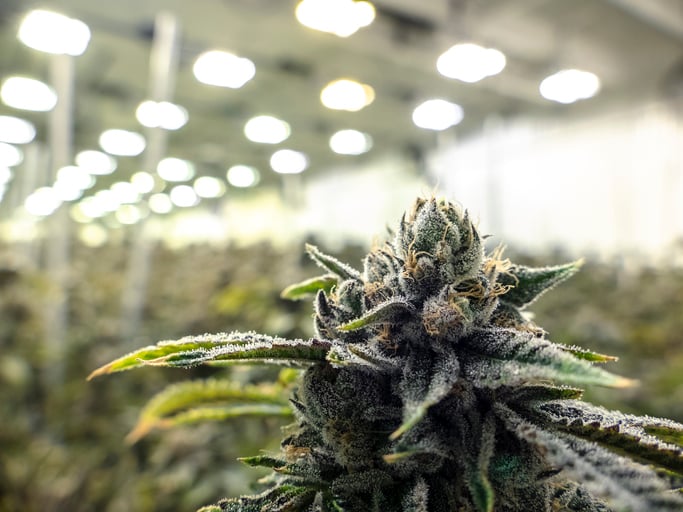The legal marijuana industry is expanding at an incredible pace. It's no secret that the demand is there, given the tens of billions of dollars in global sales that have been ongoing for decades in the black market.
However, we're beginning to see these sales shift to legal channels in Canada and select U.S. states. In 2018, legal global marijuana sales totaled $10.9 billion. But in 10 years, worldwide sales may have risen 18-fold, according to the most aggressive Wall Street projection.
Maybe the biggest question mark for businesses in the cannabis industry is how to finance their expansions. Thankfully, a few brand-name pot stocks have landed major equity investments and are sitting on a veritable war chest of cash.

Image source: Getty Images.
These cannabis stocks are rolling in the green
Between October 2017 and November 2018, the largest marijuana stock in the world by market cap, Canopy Growth (CGC 0.85%), landed three separate investments from Corona and Modelo beer-maker Constellation Brands. Inclusive of capital raises, Canopy began the year with cash, cash equivalents, and marketable securities on its books of more than 4.9 billion Canadian dollars. This cash has played a crucial role in Canopy's ability to set up infrastructure in Canada, the United States, and other foreign markets.
The same could be said for Cronos Group (CRON +0.39%), which netted itself a healthy $1.8 billion payday from tobacco giant Altria in exchange for a 45% non-diluted equity stake in the company. Altria has been contending with declining adult cigarette usage rates for decades, and rather than continuing to raise prices, it sought Cronos and cannabis as a possible long-term investment opportunity.
Meanwhile, Cronos now has more-than-enough capital to make complementary acquisitions, as well as expand its product portfolio. As a reminder, derivatives (i.e., edibles, infused beverages, concentrates, topicals, and vapes) are set to go on sale by mid-December, which should encourage Cronos Group and its peers to bolster their product offerings. Since derivatives offer considerably higher margins than traditional dried cannabis, focusing on these new offerings is a no-brainer.
Even cannabis goliaths that haven't landed a major investment partner have managed to build up impressive cash piles. As of the end of June, Aurora Cannabis (ACB 7.76%) had more than 360 million Canadian dollars in cash, marketable securities, and restricted cash on its balance sheet.
As an added bonus, investors may also view this cash as something of a downside buffer to these stocks.

Image source: Getty Images.
In fact, cash may not be king in cannabis
Generally speaking, and as the saying goes, "cash is king." This would seem to be especially true in the marijuana industry, which doesn't have easy access to non-dilutive forms of financing. But when viewed on a larger scale, marijuana war chests don't actually mean a lot.
For starters, pot stocks that have built up significant cash positions aren't really utilizing that cash to acquire other businesses. Canopy Growth's deal to acquire Acreage Holdings, for instance, involves a $300 million cash component ($2.55 a share), with the remainder of the initially announced $3.4 billion value being comprised of Canopy's common stock.
The same can be said for Aurora Cannabis, which has made more than a dozen acquisitions since August 2016 but hasn't used any significant cash component in any of these deals, save for the buyout of CanniMed Therapeutics. Even then, Aurora predominantly used its common stock to finance the acquisition. In five years, Aurora Cannabis has issued a staggering 1 billion shares of common stock, yet has hardly touched its cash when making purchases. This ongoing dilution is a big reason why Aurora's share price has moved lower, despite its market cap rising, since the beginning of 2018.
Marijuana companies have the ability to lean on common stock issuances as a means of financing their expansions, and it's made cash relatively obsolete.

Image source: Getty Images.
Cash is losing its luster as a downside buffer
Additionally, the downside buffer that cash may have been providing for marijuana stocks seems to be dwindling due to steep and ongoing losses. Canopy Growth's aggregate cash pile is down to nearly CA$3.1 billion, a CA$1.8 billion decline in a matter of six months. If we were to strip out a plethora of one-time benefits and costs and instead focus solely on the company's gross margin and operating expenses, Canopy Growth would have lost more than CA$215 million on an operating basis during the fiscal first quarter.
The same is true for Cronos Group. Although Cronos made the rare exception of putting its cash to work when acquiring Redwood Holdings to gain hold of cannabinoid beauty line Lord Jones, its cash pile has likely shrunk to $1.5 billion (that's U.S.). While its operating results show Cronos Group to be highly profitable, this is only because of changes in derivative liabilities tied to warrants given to Altria. Again, if investors focus solely on operating performance, Cronos Group continues to lose money and, as a result, may keep drawing down its cash.
Cash simply isn't king for marijuana stocks, and it's probably time we stopped treating it as such.








